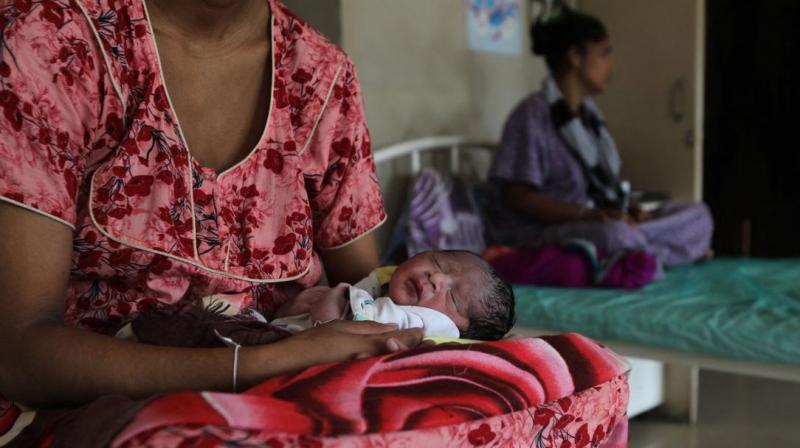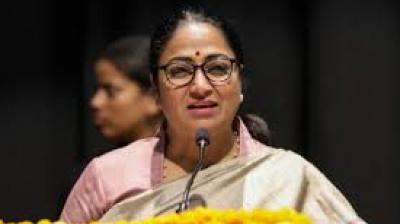
India continue to suffer some of the highest maternal mortality rates.
Every Two Minutes, a Mother Dies: Aid Cuts Jeopardize Maternal Care Worldwide; India Ranks Second in Maternal Deaths, latest News: A woman dies every two minutes due to pregnancy-related complications, according to a WHO report. The findings highlight the alarming impact of aid reductions by countries like the US and the UK, as reported by The Independent.
Citing the WHO, The Independent reported that there were 260,000 maternal deaths in 2023 — equating to 712 women a day or 30 per hour — with the vast majority occurring in sub-Saharan Africa.
Maternal deaths are defined as any death related to or aggravated by pregnancy or occurring within six weeks of the end of a pregnancy. The United Nations, under its Sustainable Development Goals, aims to reduce global maternal mortality to fewer than 70 deaths per 100,000 live births by 2030.
WHO organization has warned that many countries are far from achieving this goal. “The pace of progress has slowed to a near standstill,” the report noted.
Globally, the maternal mortality rate has improved by 40% — from 328 deaths per 100,000 live births in 2000 to 197 in 2023. However, the numbers remain high in Sub-Saharan Africa, with 454 deaths per 100,000 and minimal progress. Central and Southern Asia saw a decline, now at 112 deaths, reflecting an improvement of 285 fewer deaths since 2000.
Countries like Australia and those in Europe are performing well, with maternal death rates of just 3 and 7 per 100,000, respectively. In contrast, North America has seen a worrying trend — the rate has risen from 12 in 2000 to 16 in 2023, making it the only region with an increase.
The WHO, along with the United Nations Population Fund (UNFPA) and other leading health organizations, has warned that the recent $770 million cut in US funding for maternal health and family planning could further slow global progress — or even reverse it.
Dr. Bruce Aylward, Assistant Director-General for Universal Health Coverage at the WHO, said during a press conference: “The funding cuts risk not only halting progress, but could shift us backwards.” He warned that the cuts are already “affecting access to life-saving supplies and medicines, especially treatments for leading causes of maternal death.”
“One of the first impacts we’re seeing is countries laying off staff, not hiring, or slowing down spending on health workers. This is a real concern,” he added.
Indian and Sub-Saharan Africa
As many as 60 countries reportedly depend on U.S.-funded maternal health and family planning programs, most of which are located in Africa and South Asia. India is among the countries that benefit from this funding. According to reports, Sub-Saharan Africa and India continue to suffer some of the highest maternal mortality rates.
In 2023 alone, half of all maternal deaths worldwide occurred in just four countries: Nigeria, India, the Democratic Republic of the Congo (DRC), and Pakistan. Nigeria recorded a staggering 75,000 deaths, followed by India with 19,000, tying with the DRC.
The U.S. Agency for International Development (USAID) has played a key role in supporting India’s family planning and maternal health programs since 1992. India is currently considered a high-priority country in USAID’s global strategy for maternal and child health.
Africa remains the most dependent region on U.S.-funded family planning initiatives. These programs also support the employment of midwives in regions where access to maternal care is limited. Reports suggest that the termination of some USAID contracts has resulted in job losses among midwives, leaving pregnant women without essential care.
In February 2025, the United Kingdom’s Prime Minister Sir Keir Starmer announced plans to cut the UK’s foreign aid budget from 0.5% to 0.3% of gross national income (GNI) by 2027 to redirect funds towards defense spending.
Labour MP Sarah Champion, Chair of the International Development Committee (IDC), told The Independent: “I remain deeply concerned that the cuts to aid will hit women’s health hard and destroy all the hard-won progress around the world.”
She added, “Preventing maternal deaths is not a medical mystery; we can end them with political commitment and financial investments. Realising the right to safe pregnancy and childbirth requires continued efforts to improve the quality of care, which must be backed by adequate financial resources and supportive laws. Weak health systems and prolonged humanitarian crises have led to stagnation and even reversal of progress in many countries.”
In 2023, nearly 70% of global maternal deaths occurred in Sub-Saharan Africa, with over 100,000 of them reported in Western Africa alone. By comparison, only around 650 pregnancy-related deaths were recorded in Western countries.
Dr Pascale Allotey, Director of the Department of Sexual and Reproductive Health at the WHO, warned: “Despite advances since 2000, the pace of progress has slowed to a near standstill. In some regions, we are already sliding backwards. In this context of fragility, complacency is not just dangerous—it is deadly. When women die because of where they live, what they earn, or what rights are denied, it is indefensible—and it is preventable.”
Julia Bunting, Programme Director at UNFPA—the United Nations’ key agency for women's reproductive health—told The Independent that the decline in maternal deaths is not sufficient and is “by no means fast enough.”
She said, “We know there has been a 40 per cent decline in maternal death rates since 2000, but the progress is uneven and slowing.”
She added, “These lives can be saved. It’s not just a matter of health—it’s a matter of rights; it’s a matter of justice. We believe every woman deserves to survive childbirth. We know how to prevent these deaths: with skilled midwives, quality care, and political commitment, we can save many of these lives. But there’s an urgent need for investment so we don’t risk reversing the gains that have already been made.”
She further warned, “The combination of funding cuts, the increasing frequency of conflicts, and the impacts of climate change mean pregnant women can't access lifesaving care, and gender-based violence is rising. We can’t abandon the women and girls who need us most.”
The report is published in the Independent on Monday 07 April 2025, by Rebecca Thomas and Alicja Hagopian. For details and for better understanding visit their website.
For More News, Apart from, "Every Two Minutes, a Mother Dies: Aid Cuts Jeopardize Maternal Care Worldwide; India Ranks Second in Maternal Deaths,’ Stay tuned to Rozana Spokesman)














